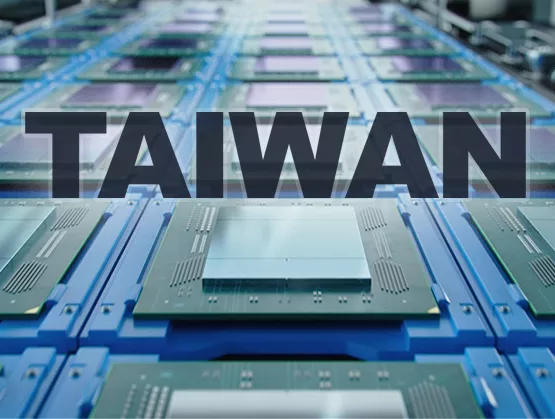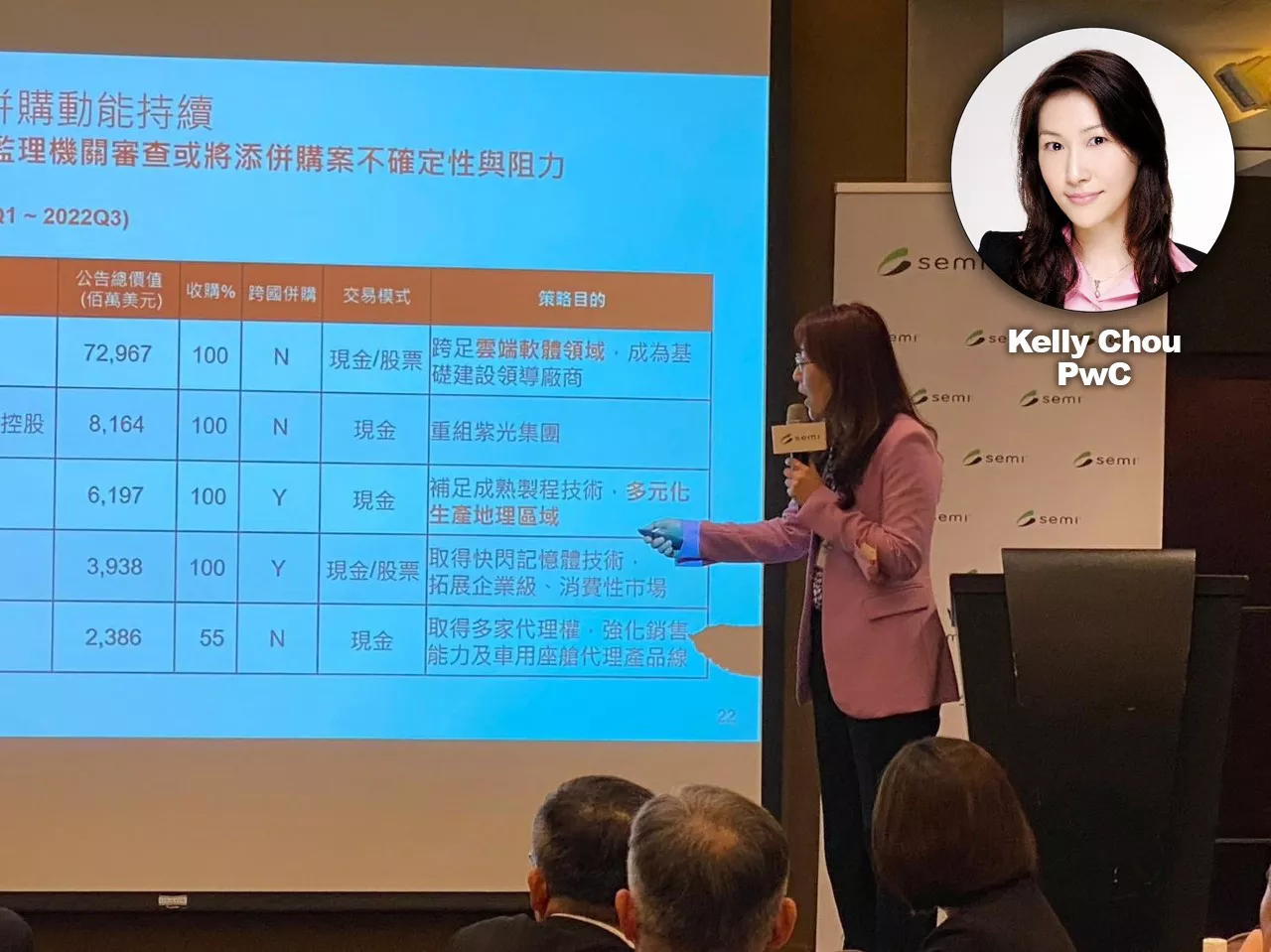
With the emergence of consolidation as a potent engine of semiconductor industry growth, global mergers and acquisitions (M&As) are sweeping the industry as companies look to accelerate advances across segments including data centers, artificial intelligence (AI), automotive chips and Internet of Things (IoT), said Kelly Chou, Managing Director of PricewaterhouseCoopers (PwC) Financial Advisory Taiwan Ltd.
According to data collected by PwC, cross-border transactions have accounted for more than 65% of semiconductor industry M&As worldwide in the past five years, and the United States and China are two of the most active regions. Four mega deals topping US$5 billion each year, or 67% of the global transaction value, during the same period underscored the surge. And while the combined value of semiconductor M&As declined in 2021, the sheer number of deals continued to hit new highs.
Speaking at the Hi-Tech Corporate Growth & Innovation Executive Luncheon hosted by SEMI in Hsinchu, Taiwan last November, Chou noted that Taiwan’s semiconductor industry neared a whopping NT$5 trillion in 2022. Small and medium-sized enterprises (SMEs) comprise 99% percent of all of the island’s chip businesses, yet Taiwan has averaged just 10 M&A deals annually over the past few years.

The disparity between the global M&A trend and Taiwan’s participation in it begs the question: To remain strong in the increasingly dynamic semiconductor industry, how should local IC design companies seize on M&As and corporate venture capital (CVC) to generate new innovation opportunities and help ensure their business are future-ready?
Semiconductor M&A deals Chou saw in 2022 could serve as object lessons for Taiwan chip companies. A few cases in point:
- Broadcom acquired VMware as a quick entry point into cloud software and to become a leading player in cloud infrastructure.
- Intel’s acquisition of Tower Semiconductor was meant to bolster the chip giant’s mature nodes, help diversify its production geographically and mitigate the impact of geopolitical conflicts.
- MaxLinear acquired Silicon Motion for its flash memory technology to expand its footprint in both the enterprise and consumer markets.
“All kinds of emerging innovative applications have become a driver for the semiconductor industry to speed up its deployments in fields with growth prospects while pursuing heterogeneous integration,” Chou said. “You rarely see companies go it alone nowadays.”
 Chou said the havoc the COVID-19 pandemic wrought across the semiconductor supply chain highlighted the strategic importance of semiconductors and at the same time seized the attention of governments and companies around the globe. Before long, they realized the value of localizing supply chains and production in ramping up the resilience of domestic chip production.
Chou said the havoc the COVID-19 pandemic wrought across the semiconductor supply chain highlighted the strategic importance of semiconductors and at the same time seized the attention of governments and companies around the globe. Before long, they realized the value of localizing supply chains and production in ramping up the resilience of domestic chip production.
“In the future, corporate cross-border M&A transactions, especially large-scale and huge transactions involving national key technologies and market share increases, may face more stringent review,” Chou said.
M&A activity for SMEs and non-core divestments of multinational giants may be in the offing, Chou said, adding that Taiwan's IC industry should seize these consolidation opportunities to help domestic companies withstand unforeseen challenges.
M&As could also be a boon to the Taiwan semiconductor industry in other ways:
- More M&A deals would help companies diversify their suite of applications and products, develop both software and hardware, and engineer the more heterogeneously integrated solutions required for advanced technologies. M&As can also aid in consolidating resources, accelerating expansion and strengthening the corporate resilience.

- For Taiwan SMEs, M&As by transnational players can serve as window into sectors they are targeting for growth and reveal potential entry points for acquisitions. SMEs can leverage Taiwan’s central role in the global semiconductor supply chain and its strategic importance to flesh out M&A opportunities and, in so doing, expand their reach overseas.
- In response to China's aim to become a self-sufficient semiconductor power, Taiwan’s chip companies should redefine their strategies for growing their business in the Chinese market through equity adjustments. For example, Phison has established a close long-term cooperative relationship through the equity integration of two Chinese subsidiaries and reinvestment companies. The move improves Phison’s future investment management efficiency and profitability in China and helps it expand in the Chinese market.
A corporate M&A doesn’t end once the ink is dry on the transaction. Several of the 40 attendees at the luncheon pointed out that strong managers at acquired companies should be kept on board to lead teams and help boost employee morale. In cross-border mergers, the parent company is well-advised to take great strides to hire the best local talent since they can be key in bridging both companies and integrating with local markets. And with fear of a new corporate culture common in acquisitions, it pays to welcome the new organization and employees with open arms, communicate expected organizational changes in advance, offer company equity, and respect the expertise of the new workers.

Chou said the success of an M&A also hinges on the ability of the parent company to allow the business development heads at the acquired organization to take calculated risks and mistakes, essential to capitalizing on synergies between the two companies and helping exploit new business growth opportunities. Success is bound to beget more success and reinvigorate the entire enterprise.
SEMI Taiwan is committed to promoting the development of the electronics supply chain and bringing the semiconductor ecosystem together to pursue new business and innovation opportunities. Through activities such as organizing networking events and generating awareness of joint venture investments and M&A opportunities, SEMI Taiwan introduces member companies to financial advisors, intellectual property experts and legal consulting firms in Taiwan and abroad to help grow the domestic semiconductor industry.
Ashley Huang is a senior marketing specialist at SEMI Taiwan.